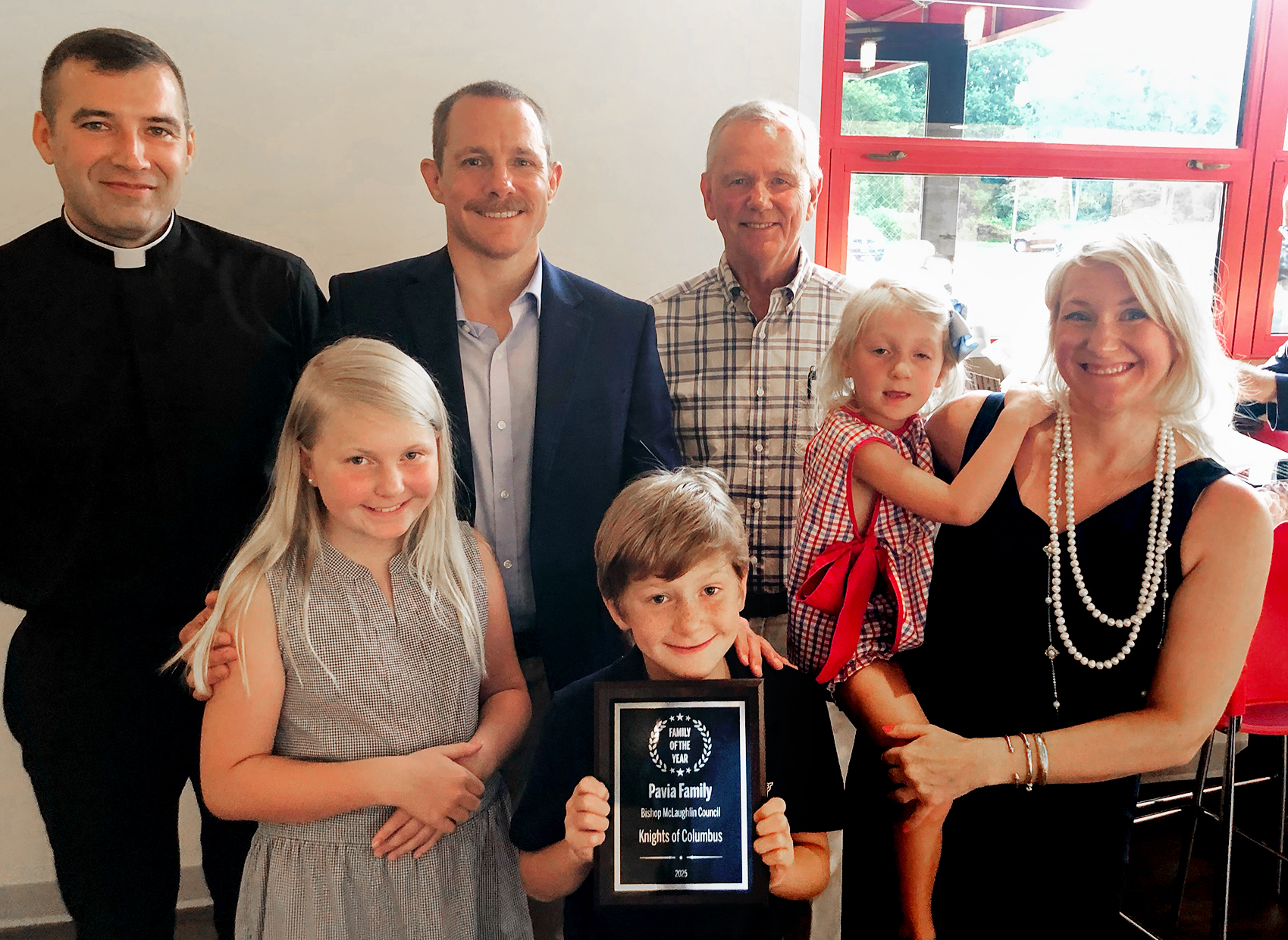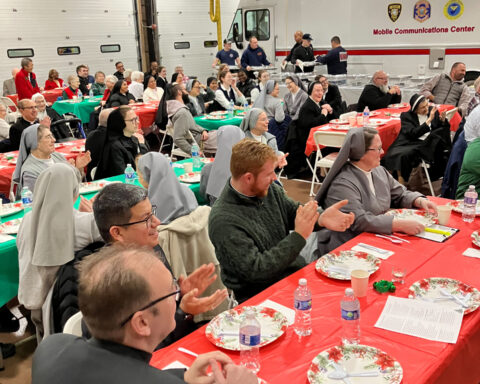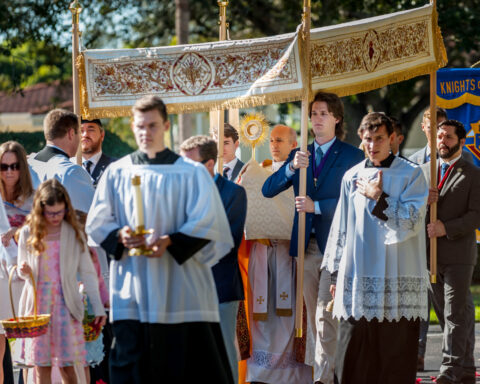Bishop Sweeney’s 2025 message regarding the finances of the Diocese of Paterson
![]()
![]()
Dear Friends in Christ,
As I complete my fifth year as your Bishop, and with special appreciation for the generosity of all the faithful, I thank Our Lord for your steadfast support of the mission and good works of our Diocese. Your offerings of time, talent, and treasure help us do the work of Jesus in encountering and serving the People of God. In the website link below¹, you will find access to the audited financial statements of the Diocese for our fiscal year 2024, which ended on June 30, 2024. I am pleased to report that the Diocese once again received an unqualified audit opinion from our auditor, Grant Thornton.
You, our parishioners, are at the core of the ministries of our Church. The good works and evangelization efforts of the Diocese are the outward signs of your personal faith, which is nurtured by prayer and participation in the sacraments. The Diocesan Ministries Appeal and the weekly parish offertory collections are both important illustrations of your faith-filled listening to the call of Jesus to be his disciples and spread his Good News, in both words and actions.
Please read the letter below from Patrick Brennan, our Chief Financial Officer. His letter explains how your sacrificial gifts are used across the Diocese, and particularly within the Central Business Office, which supports our active and retired priests, parishes, and Catholic schools. In a special way, your gifts also provide significant financial support for vocations and the formation of our seminarians, our Catholic Charities agencies, urban Catholic education, and the healthcare needs of our priests.
Energized and strengthened in our Faith as Pilgrims of Hope this Jubilee Year, and with gratitude for the election of Pope Leo XIV and your continued support and encouragement, we are working intently to spread the Good News of Jesus Christ in all that we do. I am inspired by witnessing firsthand Christ’s love and compassion so beautifully expressed in the daily spiritual and corporal works of mercy in our parishes, schools, and Catholic Charities agencies.
Thank You for all you do for our Church, the Diocese, and your parishes and schools.
Commending you to the care of the Blessed Virgin Mary, Our Lady of Hope and Good Counsel, and with a prayer for the Lord’s blessing, I remain
Faithfully yours in Christ,

[1] FY2024 Audited Financial Statements
CFO Brennan discusses the financial health of the Diocese of Paterson in 2025
By PATRICK BRENNAN
CFO, Paterson Diocese
As I reflect on a decade of serving as the Diocese of Paterson’s Chief Financial Officer, I’m deeply appreciative of this very special opportunity and privilege to help support the Diocese’s mission through collaborative stewardship of its temporal assets. I can report that the fiscal health of the Diocese of Paterson remains stable despite some significant ongoing and anticipated challenges. This stability has been enabled by the wonderful generosity of many committed parishioners and donors and achieved through the thoughtful day-to-day efforts of our pastors, administrators, school leaders, agency heads, and lay staff who so diligently manage the ministries, evangelization, and human services of the Diocese. For example, your consistently generous contributions to the annual Diocesan Ministry Appeal ensure that significant resources are dedicated every year to four areas of great mission impact: Catholic Charities, Seminarian Education, Support for Inner-City Catholic schools, and the Care of Retired and Infirm Priests.
Grant Thornton LLP recently completed its annual audit of the financial statements of the Diocese for the fiscal year ending June 30, 2024. These financial statements reflect the financial activities of the Chancery Office, including central business operations, self-insurance programs, priests’ catastrophic healthcare, the Mission Fund, the Catholic Education Trust, and Calvary Cemetery. Individual parishes, schools, and social service organizations are distinct from the Chancery and maintain separate financial records and reporting. The audit report is accompanied by an unmodified opinion, which is the highest level of assurance issued by the auditors, indicating that they believe the financial statements present fairly the Chancery’s financial position as of June 30, 2024 and 2023. A copy of Grant Thornton’s audit report and the accompanying financial statements is now available for review on the diocese website.
The following is a brief summary of the significant factors affecting the financial status of the Diocese in Fiscal 2024:
Central Business Operations:
Parish assessment revenues of $6.16 million were essentially flat year-over-year due to little change in the overall economics of our 107 parishes during Fiscal 2024. Diocese Ministry Appeal revenues of $3.63 million were flat as well due to the uncertain economic environment in the Fall of 2023 for most donors. Rental income increased to $418,000 due to the reversal of an accounting entry for a planned rental asset that ultimately did not materialize due to COVID-19. Total revenues were down to $55.3 million in Fiscal 2024 versus $64.3 million in Fiscal 2023 due to the one-time $12.5 million gain in 2023 from the sale of the former Neumann Prep property.
Program expenses for evangelization, social ministry, and pastoral activities of $8.33 million increased by 1.3 percent over the prior year. School subsidies and other education-related expenses of $1.8 million decreased by about 1.7 percent over the prior year, reflecting continuing student attrition at several elementary schools and the Diocese’s commitment to keeping Catholic education affordable while helping schools explore ways to remain sustainable.
The following pie charts depict the major sources of revenues and areas of expense for Central Business Operations in Fiscal 2024. In Fiscal 2024, about 78 cents of every dollar of income to the Diocese was used to directly support the evangelical, ministerial, and educational missions of the Diocese. Additional details about revenues and a breakdown of expenses by functional area are presented within the audited financial statements on the Statement of Activities on page 6.
![]()
Self-Insurance Programs
The Diocese is self-insured for all employee benefits and liability coverages and also provides these insurances to our parishes, institutions, and related agencies. Premiums charged and payments made on claims appear in the consolidated financial statements. In fiscal year 2024, total premiums collected for insurance were $35.7 million, and total claims and expenses were $33.3 million, both of which are reflected as part of the change in net assets in Fiscal 2024.
Financial Priorities Going Forward
In Fiscal 2024, the Diocese was relatively stable financially despite somewhat mixed results in the broader economic landscape, especially sticky inflation. The second half of the fiscal year saw strong returns in the financial markets, which helped with the funding levels of our pensions and endowments. We remained vigilant in our spending to ensure it was always prioritized based on its impact on our mission and works of ministry, education, and evangelization.
The Diocese Finance team focuses on providing accurate and timely financial reporting, billing, and payment processing, as well as financial analysis and insights to help Diocese, parish, and school leaders with planning and decision-making. Some of the priority financial areas we addressed in Fiscal Year 2024 include:
- Monitoring parish and school financial status: The great majority of parishes and schools remained stable financially in Fiscal 2024, but a small group continued to face significant financial stresses and uncertainty. As CFO, I’ve been working with a team of Diocesan leaders to meet periodically over the past three years to assess the financial, ministerial, and sacramental challenges faced by stressed urban parishes. For example, St. Michael parish in Paterson was indefinitely closed in 2024 due to very significant and costly structural safety issues with its two towers. As a result, we are exploring possible options for creative and collaborative solutions for the St. Michael property that could benefit the Little Peru community. We also continue to monitor parish fiscal challenges, such as flat or declining offertory, as well as the rapidly increasing costs of facility maintenance and repair expenses, and property and liability insurances. In many instances, these expenses are rising faster than parish income, resulting in increasing financial strains in a significant number of parishes.
- Lay Retirement Plans: In late winter 2024, we implemented several major changes to strengthen the Lay Pension for the long-term benefit of pensioners. Most notably, we worked with our actuaries at Gallagher to offer an optional one-time lump-sum payout opportunity to pension participants at the current 55 percent funded level. About 50 percent of lay pension participants decided that it was advantageous to elect this lump-sum option. This result was in line with our expectations and greatly enhanced our ability to fund the Lay Pension for decades to come. Concurrently, employee participation levels in the Lincoln 403b defined contribution retirement plan remained high in Fiscal 2024, with 64 percent of employees participating voluntarily and receiving 3 percent matches, with certain pension-eligible employees receiving additional special grants.
- Insurance Benefits: Despite our efforts to restructure our health benefits options for employees to better align with rising costs in 2023, we still felt the squeeze of claims exceeding premiums in our self-insured plan in 2024. Adoption of our new Health Savings Account (HSA) option, which provides triple tax-advantaged lifetime savings for employees and helps to reduce employer costs, was slow, but we believe it will increase as the word gets out about its many benefits. Longer term, we still believe that partnering with other New Jersey dioceses on healthcare, as has been the case in Michigan for decades, is the most promising long-term option to achieve sustainable healthcare cost savings through its much larger pool of covered employees and family members, substantially increased leverage in pricing negotiations, elimination of redundant administrative infrastructure, and strengthened Catholic health issues advocacy in the New Jersey legislature.
- We continue to struggle with rising Property and Liability premium rates due to increasing claims losses across the industry. Carriers now wait until the last possible moment to provide rates, as they aim to minimize their own uncertainty and risk. This environment is challenging because property and liability insurance are significant operating expenses for our parishes, schools, and agencies. We are working closely with our insurance consultant to explore options that minimize the impact on our entities while ensuring we always have sufficient coverage in place to manage financial risks prudently.
- Funding Sexual Abuse Claims: In Fiscal 2024, there were no additional claims related to the Independent Victims Compensation Fund, which was initiated by the five New Jersey dioceses in 2019. Additionally, the New Jersey Child Victims Act windows were opened in December 2019 and reopened in December 2021. As of early May 2025, there are 109 open claims filed under these Acts naming the Chancery, three more than in May 2024 due to new filings. Significant uncertainty remains about the future financial impact of the Child Victim Act claims, however, sexual abuse claim expenses to date have been manageable using the proceeds from the sale of excess diocesan properties which were no longer in use or needed.
I’m deeply grateful for the incredible generosity of so many parishioners and benefactors of our parishes and schools, and for the unwavering efforts of our priests, religious, teachers, lay leaders, and staff. The vitality and resilience of our parishes, schools, and agencies stem from your faithful commitment to spiritual and corporal works of ministry, evangelization, and Catholic education. I remain thankful to be part of that effort and to continue serving the Diocese’s mission by safeguarding its financial resources for Christ’s Mission and God’s Greater Glory.







